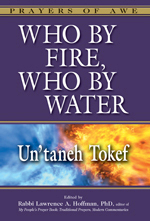The Kosher Bookworm: Post-Labor Day Blues: early school, early shul, early teshuva
The Kosher Bookworm
by Alan Jay Gerber
Issue of August 27, 2010/ 17 Elul 5770Imagine: Selicot before Labor Day. This is what we will be experiencing this year.School begins earlier this year as well so as to enable our youth to learn the relevant laws and lore of this most sacred of seasons. After all, there has to be a break between the pool and the shul, and the yeshivas and day-schools provide an appropriate spiritual venue.
So, the Bookworm, too, will devote the next few columns to the literature of the season for your spiritual and educational enrichment.
No matter your religious denomination, the reading of “Un’taneh Tokef” during Rosh Hashanah and Yom Kippur services is the centerpiece of both the liturgy and theology of the season. “Un'taneh Tokef,” gives both a face and a word to our heartfelt fears as to our destiny in the year ahead. From physical survival to economic well being, our destiny is in the hands of the Almighty. “Who by Fire, Who by Water” (Jewish Lights, 2010) is the first book in the English language to deal exclusively with the prayer and its author, Rav Amnon. This book, edited by Dr. Lawrence A. Hoffman, gives an assortment of eclectic views as to how we should parse the deeper meanings of this prayer.
Among these essays is, “A Biblical Perspective,” by Dr. Marc Brettler, the Dora Golding Professor of Biblical Studies at Brandeis University. In his essay, Dr. Brettler goes into great detail breaking down the various literary components that make up this prayer. He highlights the biblical base and rationale behind the theology of not only this prayer, but how "Un'taneh Tokef" defines the very theme of teshuva (repentance).
Another essay, “The Poetics of Prayer,” by Dr. Reuven Kimelman, analyses the prayer's poetic structure. Kimelman begins by stating that, “the Un’taneh Tokef is to Rosh Hashanah what Lecha Dodi is to Shabbat. Its imagery captures the spirit of the day more memorably than the classical Rabbinic liturgy to which it has been added.”
This comparison does not surprise me as Dr. Kimelman is the author of “The Mystical Meaning of Lecha Dodi and Kabbalat Shabbat,” the foremost work on that prayer. Based on his experience with this type of genre liturgy his focus is upon the deeper meaning behind the literary structure.
“The Four Holinesses of Un’taneh Tokef: A Halakhic Understanding” by Rabbi Daniel Landes, Rosh Hayeshiva of the Pardes Institute in Jerusalem, goes deep into a spiritual analysis of the prayer and breaks it down into four components: Kiddush Hashem/ Martydom, K’dushat Hayom, K’dushat Hashem / Holiness of G-d, and K’dushat Hachayim. Each component is explained in the perspective of the theological and literary power that is inherent in it. Rabbi Landes’ approach is as close to a Dvar Torah on “Un’taneh Tokef” as there is. His deep appreciation for the fate and faith of its author, Rav Amnon, is prominent in his consideration of this prayer’s content and theme.
Finally, Mechon Hadar’s Rabbi Elie Kaunfer’s essay,”Passing Before G-d,” comments on the literary themes of this prayer, while at the same time, explaining its biblical origins and Talmudic base in Mishnah Yoma 1:3.
“The core of Un’taneh Tokef,” according to Rabbi Kaunfer, “is actually the re-examination of our varied relationships with G-d on the annual judgment day. The poem’s biblical allusions juxtapose images of G-d judging us, supporting the weak among us, and anticipating our collective redemption. Our fate is at once deserved and random. Our passing before G-d can be our end or our [re]birth. By looking at Un’taneh Tokef – and, indeed prayer in general – in light of its literary allusions and nuances, we open up new possibilities in our relationship with G-d.”
These essays are a sample of the first book in a series on high holiday liturgy that will be published by Jewish Lights Publishing.
Before I conclude let me note the availability of volume 10 of “Hakirah: The Flatbush Journal of Jewish Law and Thought.” The journal can be obtained by emailing HakirahFlatbush@MSN.com. Hakirah's contents and teachings will inspire you throughout the upcoming holiday season.

 64.0°,
A Few Clouds
64.0°,
A Few Clouds 




